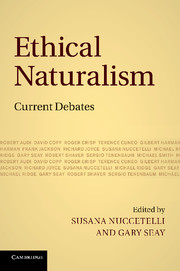Book contents
- Frontmatter
- Contents
- Contributors
- Introduction
- Chapter 1 Naturalism in moral philosophy
- Chapter 2 Normativity and reasons: five arguments from Parfit against normative naturalism
- Chapter 3 Naturalism: feel the width
- Chapter 4 On ethical naturalism and the philosophy of language
- Chapter 5 Metaethical pluralism: how both moral naturalism and moral skepticism may be permissible positions
- Chapter 6 Moral naturalism and categorical reasons
- Chapter 7 Does analytical moral naturalism rest on a mistake?
- Chapter 8 Supervenience and the nature of normativity
- Chapter 9 Can normativity be naturalized?
- Chapter 10 Ethical non-naturalism and experimental philosophy
- Chapter 11 Externalism, motivation, and moral knowledge
- Chapter 12 Naturalism, absolutism, relativism
- Bibliography
- Index
Chapter 7 - Does analytical moral naturalism rest on a mistake?
Susana Nuccetelli and Gary Seay
Published online by Cambridge University Press: 05 January 2012
- Frontmatter
- Contents
- Contributors
- Introduction
- Chapter 1 Naturalism in moral philosophy
- Chapter 2 Normativity and reasons: five arguments from Parfit against normative naturalism
- Chapter 3 Naturalism: feel the width
- Chapter 4 On ethical naturalism and the philosophy of language
- Chapter 5 Metaethical pluralism: how both moral naturalism and moral skepticism may be permissible positions
- Chapter 6 Moral naturalism and categorical reasons
- Chapter 7 Does analytical moral naturalism rest on a mistake?
- Chapter 8 Supervenience and the nature of normativity
- Chapter 9 Can normativity be naturalized?
- Chapter 10 Ethical non-naturalism and experimental philosophy
- Chapter 11 Externalism, motivation, and moral knowledge
- Chapter 12 Naturalism, absolutism, relativism
- Bibliography
- Index
Summary
More than a century ago, G. E. Moore famously attempted to refute all versions of moral naturalism by offering an extended inference consisting of the open question argument followed by the charge that moral naturalism commits a “naturalistic fallacy.” Although there is consensus that this extended inference fails to undermine all varieties of moral naturalism, the open question argument (OQA) is often vindicated as an argument against analytical moral naturalism. By contrast, the charge that analytical naturalism commits the naturalistic fallacy usually finds no takers at all. In this paper we argue that analytical naturalism of the sort recently proposed by Frank Jackson (1998, 2003) and Michael Smith (2000) does after all rest on a mistake – though perhaps not the one Moore had in mind when he made the naturalistic fallacy charge.
Analytical moral naturalism is roughly the doctrine that some moral predicates and sentences are semantically equivalent to predicates and sentences framed in non-moral terms. One attraction of analytical naturalism is that it promises to deliver a naturalistic account of the content of moral judgment that leaves no ground for objections inspired by the OQA – which argues, in brief, that no matter how much purely descriptive information is available about an action, it’s still an open question whether that action is right or its end good, or whether we ought to perform it. Analytical naturalism attempts to accomplish this by resorting to conceptual analysis for moral predicates and sentences. Given this doctrine, it is at least possible that there are some such a priori or conceptual equivalences. If so, it is at least possible that the moral reduces to the natural in an a priori or analytical way. But our version of the OQA challenges this claim by showing that the reductions envisaged by these analytical naturalists are open to doubt on a priori grounds. We further contend that, in the dialectical context created by a properly construed OQA, a “digging in the heels” defense of such reductionist strategy would in the end beg the question against the Moorean.
Keywords
Information
- Type
- Chapter
- Information
- Ethical NaturalismCurrent Debates, pp. 131 - 143Publisher: Cambridge University PressPrint publication year: 2011
Accessibility standard: Unknown
Why this information is here
This section outlines the accessibility features of this content - including support for screen readers, full keyboard navigation and high-contrast display options. This may not be relevant for you.Accessibility Information
- 1
- Cited by
